New Delhi: The 2019 Economic Survey has advised the government to step in and take on a major role in the realm of data collection, storage and analytics. It argues that data should be made a “public good” and should be utilised for ensuring effective governance.
“To ensure that the socially optimum amount of data is harvested and used, the government needs to step in, either by providing the data itself or correcting the incentive structure faced by the private sector, depending on the nature and sensitivity of data,” the Economic Survey has noted.
It has also attempted to address privacy concerns, which are likely to emerge with this proposal, contending that the government is not collecting any new data but just integrating the existing data.
“The prospect of empowering the government with such comprehensive, exhaustive information about every citizen may sound alarming at first. However, this is far from the truth,” says the survey, adding that people could also opt out of “divulging data to the government”.
Over the past few months, the handling of economic, commercial and user data has emerged as a very contentious issue in the country. The issues with data and its storage were further amplified with the RBI’s rules, put out in October 2018, regarding data localisation and the draft e-commerce policy. The RBI rules mandate that firms working in India would have to store all the generated data domestically.
Using data for governance
The Economic Survey claims that with the recent data explosion, there has been a sharp decline in “marginal cost of data” and a sharp rise in its “marginal benefit”.
“While private sector does a good job of harnessing data where it is profitable, government intervention is needed in social sectors of the country where private investment in data remains inadequate,” the survey notes. As Indians generate exponential amounts of data, the government to provide more effective governance could utilise this data, it contends.
Also read: ‘Nudge’ is the secret behind success of Modi’s pet projects, says Economic Survey
The survey argues that these massive volumes of data can enable the government to “enhance ease of living for citizens, enable a truly evidence-based policy, improve targeting in welfare schemes, uncover unmet needs, integrate fragmented markets, bring greater accountability in public services, generate greater citizen participation in governance”.
How govt can utilise data to improve governance
The survey provides three ways through which the government can use data to provide better governance.
First, it talks about merging disparate datasets collected by different agencies, which would enhance the designing and implementation of welfare schemes.
Second, “data needs to cover a critical mass of individuals/firms so that comparisons and correlations can be assessed among individuals/firms to generate useful policy insights”.
Third, the data must range over a long period of time, to enable evidence-based policy-making.
What could the system look like?
The Economic Survey notes that government data collection in India is extremely decentralised, thus there is a need to integrate data collection across ministries and agencies.
“Because, these datasets are unconnected, each ministry only has a small piece of the jigsaw puzzle that is the individual/firm. However, if these different pieces could be put together, we would find that the whole is greater than the sum of parts,” the survey notes.
Also read: India can achieve Modi’s $5 trillion economy target via private investment: Economic Survey






